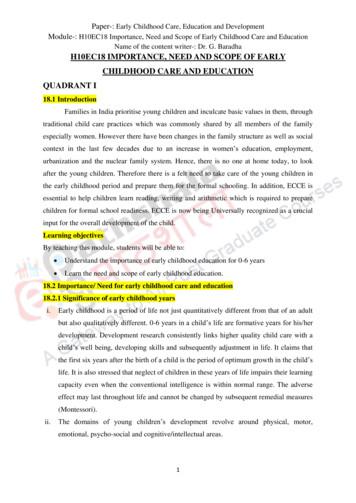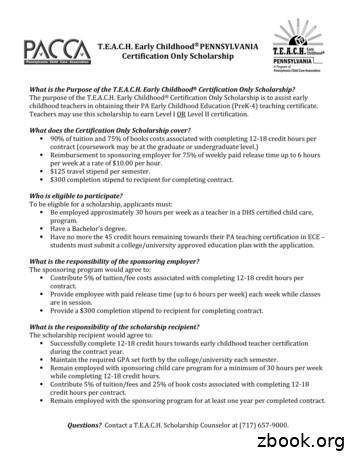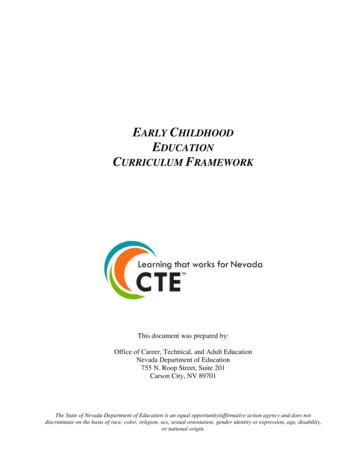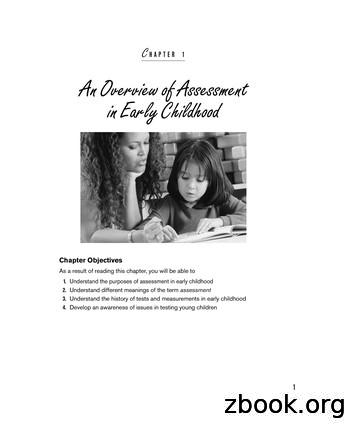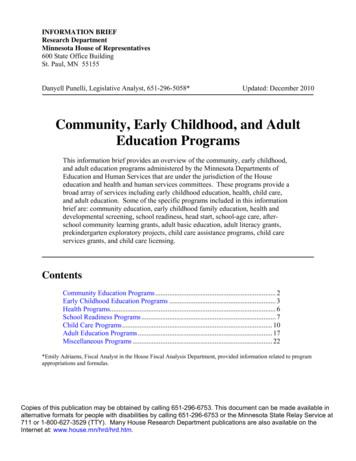Advisory Board Early Childhood - Boston Ready
Advisory BoardEarly ChildhoodICI – 20 Park Plaza – 13th floorUniversity of Massachusetts BostonApril 16, 2009 10:00 to 11:30light lunch to follow
Agenda Networking 10:00 PowerPoint 10:15-11:00––––EECISBoston ReadyBuilding CareersIncluding All Children Discussion of Big Questions11:00-11:30 Lunch and more networking 11:30 - ?
Goals of Advisory Advisory members act as resources, advocates, anda catalyst for change Accomplishments in Early Childhood at theUniversity of Massachusetts is the result of ourrespectful, responsive, and reciprocal relationshipswith our community partners Share resources
Graduate College of EducationRolls out Early Education andCare in Inclusive Settings(EECIS)New Bachelors of Arts
Why EECIS, why now?Support for community early childhood workforce seeking degrees 2003 Private grant funded early childhood position at UMass Boston 2004 GCE partnered with CPCS Human Service major with concentration in early childhood. Grant money: Building Careers – 100 students ECE scholarship: 20 students 2005 – undergraduate early childhood teacher licensure (Pre-K -2) 2006 – Boston Ready and Including All Children, grants 2007 - graduate early childhood teacher licensure (Pre-K - 2) 2008 - CPCS stopped admitting students
Goals of EECIS Create a degree specific for early childhoodworkforce Facilitate transfer from community colleges Acknowledge the specialized areas within the field Integrate courses with undergraduate teacherlicensure Maintain high quality, while eliminating the barriers ofteacher licensure program
Challenge:A career lattice without deadends Teacher lice programs have crowdedcurricula: General education requirements (liberal arts and science requirements),Education course requirementsTwo practica, one in public schoolThree challenging MTEL tests.Early Childhood Educators (non-public schoolsettings) Bachelor degree Option of teachers license, in future
EECISBachelor of Arts in Early Education and Care in InclusiveSettings with a concentration in:1. Infant/Toddler and Early Intervention2. Preschool Education and Care3. Family Support and Engagement4. Youth and Community Outreach5. Administration and Supervision
Integration with MassRegulationsEECIS ConcentrationState RegulationsInfant/Toddler & Early InterventionDPH -Early InterventionEEC – Infant/toddler lead teacher,EEC - Family Child CarePreschool Education and CareEEC – Preschool lead teacherEEC - Family Child CareFamily Support and EngagementEEC - Family Child CareYouth and Community OutreachEEC – Out-of-school time leaderAdministration and SupervisionEEC – Director IIDPH – Department of Public HealthEEC – Department of Early Education and Care
Approval ProcessApril 2008 – Nov 2008– Wrote proposal, 6 new syllabi, and revised 5 others– Passed all campus level committees GCE:– Program Director, Dept. Chair, Collegiate Committee, Dean UMass Boston– Professional Education Coordinating Council– Faculty Committee– Director of Undergraduate Education– Provost– Reviewed by external team– Passed the University of Massachusetts, Board of Trustees– Full approved Nov 21, 2008the Massachusetts Board of Higher Education
External Environment Quality standards – supporting bachelor degrees: Boston’s initiative, Thrive in Five Massachusetts: Universal Pre-K funding Early Childhood Program Standards Nationally: Head Start NAEYC Accreditation standards Sept 2008: Roles, Relevance, and Responsibilities:Higher Education in the Field of Early Care &Education Collaborative national report Recommends Higher Education make changes tomeet EC workforce needs
Early Childhood CoursesTeacher Licensure & some EECIS concentrations:ECHD 420 Instructional StrategiesECHD 441 Science & MathTeacher LicensureOnly:EDC 446 UnderstandingReadingECHD 490 PracticumECHD 491 Teacher InquiryTeacherLicensureEECISAll teacher licensure and all EECIS:ECHD 201 FoundationsECHD 211 Child DevelopmentECHD 221 Positive EnvironmentsEDC 406 Sociocultural PerspectivesECHD 422 Observing, Documenting & AssessingECHD 440 Language & Literacy DevelopmentEECIS only:All concentrations:ECDH 290 InternshipECHD 490 Internship IIECHD 317 EthicsSpecific concentration:ECHD 208 Infant ToddlerECHD 435 Family SystemsECHD 449 SEIECHD 450 LeadershipECHD 457 Youth EducationECHD 459 AdministrationECHD 466 Early InterventionEDC 485 Literacy InternshipECHD 487 Literacy Mentoring
EECIS Bachelor Degree Who?– Traditional UMass Boston students JumpStart (work-study program)– Transfer students Working on articulation from five feedercommunity colleges Urban– Workforce development Recruit Matriculate Future collaborations
BA Requirements1. General education requirements - GCE– 45 credits (English, math, lab science etc.)2. EECIS CORE of 9 early childhood courses: Six shared with undergraduate teacher licensure Two internships Ethics course3. Concentration requirements4. Electives to make 120 credit hoursStudents may have more than one concentration
Overview of EECIS9 Required courses, for all concentrations:1. Foundations of Early Intervention and Education for AllYoung Children2. Child Growth and Development Birth to Age Eight Including Special Needs3. Supporting Young Children's Social Interactions andEmotional Growth4. Internship in Early Education and Care 15. Observing, Documenting & Assessing in Early Childhood6. Language Development & Literacy in Early Childhood7. Sociocultural Perspectives: Building Family, Communityand School Relationships8. Responsibility and Ethics in Early Education and Care9. Internship in Early Education and Care 2
EECIS Concentration Four specialty courses in each of the five concentrations Two required ECHD courses Two additional courses, either ECHD or from othercolleges Students may have more than one concentration
Infant/Toddler & EarlyIntervention (DPH) Development Specialist *pending approval (EEC) Infant-Toddler lead teacher (birth to three years) Competencies in observing, assessing, and fosteringthe development of children from birth to three yearsof age Internships in inclusive settings (work site placementswill be considered for internships wheneverappropriate)Two Required ECHD coursesStructured electives (choose 2) Introduction to I/T Care andEducation Early Intervention ENGL335 Children's Literature ANTH L301 Childhood in America ANTH 285 Language and Culture Psych 300 Personality Sociol 242 The Family Psych 441 Family and the Child
Preschool Education and Care EEC Preschool lead teacher (three to five year olds) Head Start, child care, nursery schools, etc. Competencies in creating positive environments,curriculum design, assessment and family engagement Internships in inclusive settings (work site placementswill be considered for internships whenever appropriate)Two Required ECHD coursesStructured electives (choose 2) Science and MathematicsInstructionfor All Young Children Technology for All Young Children ECHD 487 Literacy Mentoring ANTH L301 Childhood in America ENGL335 Children's Literature ANTH 285 Language and Culture Psych 447 Cognitive Development Psych 441 Family and the Child Sociol 242 The Family
Family Support and–Home visitor, outreach, and parent education, play groupEngagementfacilitator, parent group leader, family literacy specialist,home-based educator, etc. Competencies in family engagement to support youngchildren’s development Internships in inclusive settings (work site placementswill be considered for internships whenever appropriate)Two Required ECHD coursesStructured electives (choose 2) Introduction to Infant and ToddlerCare and Education Family Systems - Support andEngagement ANTH L301 Childhood in America ANTH 285 Language and Culture Psych 300 Personality Sociol 242 The Family AMST 350 Race, Class, Gender AMST 301L Childhood in America WOST 100 Women in Society
Youth and Community OutreachEEC Out-of-school time leader (6-16 years)– after-school initiatives, community serviceprograms Competencies t0 support learning in informal settings,forging links with families and community resources Internships in inclusive school-age settings (work siteplacements will be considered for internships)Two Required ECHD coursesStructured electives (choose 2) Sheltered English Instruction Youth Education in Out-of-SchoolSettings through CommunityBasedand Youth Service Organizations ANTH L301 Childhood in America PSYCH 350 Learning and Memory Sociol 201 Youth and Society Sociol 242 The Family Sociol 336 Sociology of Education Sociol 440 Sociology of Knowledge AMST 350 Race, Class, Gender
Administration & Supervisionin EEC Programs EEC Director II Program coordinators, youth, child and familyadvocates, policy makers, early childhood specialists,grant managers, etc. Competencies to support educational outcomes, work withcommunities and families, financing, budgeting, state andfederal regulations and policies, supervision and advocacy Internships in administrative role in an inclusive setting (worksite placements will be considered for internships wheneverappropriate)Two Required ECHD courses Instructional Strategies for AllYoungChildren with a Focus on CreativeArts Administration and Supervision ofPrograms for Young ChildrenStructured electives (choose 2) ECHD 487 Literacy Mentoring ENGL335 Children's Literature ECDH 450 Leadership in EarlyEducation and Care PSYCH350 Learning and Memory AMST 350 Race, Class, Gender
Potential Financial Support Prior to matriculation: Building Careers Supports EEC workforce to matriculate Matriculated Students: ECE Scholarship ( 4 million/year in Mass.) Funds up to six courses per yearStudent must work in EEC program for one-year Grant - Including All Children Federal, Teacher Preparation Grant TEACH Grant Program Work opportunities: Jumpstart Work study opportunity in preschool setting UMass Boston, Early Learning Center Part-time employment opportunities
EECIS FacultyAnne Douglass, Fall 2009Brandeis University, Heller School for Social Policy & ManagemeResearch: Early Intervention Linkages ProjectEducation of Homeless Children for DOEDissertation: Strengthening Families InitiativeTeaching experienceWheelock CollegeNortheastern UniversityZero to Three TrainerEarly childhood direct care experience:Accreditation Support including BPSProject Hope (Dorchester)Burr Cooperative Nursery School (Auburndale)Acorn Preschool (Chinatown)
Boston Ready2006-2009
How Boston Ready Informedthe Process Credibility at UMass BostonConnection with community providersAdvisory Board supported, informed processStrong literacy base of coursesCohort supportBlended format of coursesAdjunct faculty resources identified
Lesson Learned Professional Development– Scheduling– Organization– Linkage with coaching Course work– Blend courses– Non-tradition schedule Supports needed– Online learning– MTEL– Laptop lending program
This Year In Boston flectionWork PlanCoaching
Children’s development progress:Boston Ready PD Group 51% of the children participating in BostonReady Professional Development classroomsshowed significant learning gains on thePeabody Picture Vocabulary Test-III
Classroom Quality Analyses indicated that Boston Ready classroomshowed significantly higher gains in ClassroomLanguage Quality than the Control Group over thecourse of the 2007-2008 school year. The Boston Ready Classrooms showed significancegains in Book Reading Quality when compared withthe Control Group. ALL Boston Ready classroom showed gains in theareas of language quality, management and centerquality.
Teacher Survey 100% of Boston Ready Classroom reported receivingformal OWL training The vast majority of Boston Ready teachers reportedthat OWL literacy coach was supportive and helpfulto their teaching efforts. The majority of Boston Ready teachers reported thatthe children in their classroom were learning a lotwith the OWL curriculum.
Qualitative interviews with teachersregarding Boston Ready Interviewer: HAVE YOU FOUND THE (BostonReady) COURSES TO BE? Teacher Um, I’ve liked—so far I’ve really loved twoof them because they were more than justtheory, they were actual, like, application and usedirectly in the classroom like right away. Interviewer: OKAY, SO THAT WAS REALLYHELPFUL TO YOU? Teacher Yes, we—I mean, like, our assignmentswere directly linked to the things that we were doingin our classroom, so that was really great.
Another qualitative interview Interviewer: OK. AND WHAT DID YOU THINK ( ofthe Boston Ready Workshops) ? Teacher: I thought they were great, very informative.You know, it gave me a it brought in myunderstanding about the curriculum, the BuildingBlocks curriculum and the OWL curriculum. I found itvery helpful, the tips you know, the insights that thepresenters gave us. I thought they were really, really,really great. You know, their insights, and theinformation, and you know overall, I gained a greatdeal of knowledge attending workshops.
Building CareersLisa Van Thiel
Student DataFall 2008 47 students enrolled incourses 18 students completedmatriculation process 7 received scholarshipSpring 2009 28 courses taken 3 students droppedThis year 53 students participated in BuildingCareersResearch Reinvisioned for the 21stCentury
Supports and Lesson Learned Grow technology skills– Set up email– Blackboard support face to face class in fall Support Students in writing– On-line course(s) not as attractive– Face to face preferred for this population Submit application by November for scholarshipfunding in January
Future plans Current Building Career Participant will meetin late May– Matriculation– FAFSA Free Application for Federal StudentAid (FAFSA) New Recruits FY 2010– Seek individual with Associates Degree– 20 new recruits– Agree to matriculate by Fall 2010
Including All Children (IAC)Jorgelina Abatte-Vaughn
Exciting Times for ECE America Resourceand Recovery Act(ARRA)
Big Questions: Given the wide variety of funding that will be comingforward for early childhood and higher education,what partnerships will be important to be formed sowe can prepare for writing proposals? What should be the most important things thatUMass Boston should pursue?
Big Questions:Public SchoolsHead StartsChild CareFamily Child CareEarly InterventionAfter School ProgramsInfant ToddlerPreschoolersAfter schoolFamily SupportsAdministration How can we develop a continuum of competenciesfor early childhood educators for all settings/all ageranges? How can we best define the differences betweenassociates level competencies (outcomes) andbaccalaureate level competencies (outcomes)?
BibliographyWashington, V. (2008) Roles, Relevance, and Reinvention: HigherEducation in the Field of Early Care and Education. Boston:Wheelock College. http://www.cayl.org/node/54
Apr 16, 2009 · Regulations EECIS Concentration State Regulations . Preschool Education and Care EEC –Preschool lead teacher EEC - Family Child Care Family Support and Engagement EEC - Family Child Care Youth and Community Outreach EEC –Out-of-school time leader Administration and Supervision EEC –Director II DPH –Department of Public Health
Understand the importance of early childhood education for 0-6 years Learn the need and scope of early childhood education. 18.2 Importance/ Need for early childhood care and education 18.2.1 Significance of early childhood years i. Early childhood is a period of life not just quantitatively different from that of an adult
T.E.A.C.H. Early Childhoodâ PENNSYLVANIA Certification Only Scholarship What is the Purpose of the T.E.A.C.H. Early Childhood Certification Only Scholarship? The purpose of the T.E.A.C.H. Early Childhood Certification Only Scholarship is to assist early childhood teachers in obtaining their PA Early Childhood Education (PreK-4) teaching certificate.
Early Childhood Education I L1 Early Childhood Education II L2 Early Childhood Education III L3C Early Childhood Education Advanced Studies AS The core course sequencing with the complementary courses provided in the following table serves as a guide to schools for their programs of study.
CHAPTER 1 An Overview of Assessment in Early Childhood Understanding Assessment in Infancy and Early Childhood Not too long ago, resources on early childhood assessment were limited to occa-sional articles in journals, chapters in textbooks on teaching in early childhood pro-grams, and a few small textbooks that were used as secondary texts in .
ECE 240 - Administration of Early Childhood Care and Education Programs (3) ECE 241 - Administration: Human Relations for Early Childhood Education (3) Colorado Mesa University B.A. Early Childhood Education - Early Childhood Special Education Advisor: Vail Shoultz-McCole vshoultz@coloradomesa.edu 970-255-2674
Early Childhood Care, Development and Education (ECCDE) is a term that is used interchangeably worldwide but refers to the same concept of early childhood education and cognitive development. The World Bank for instance refers to it as Early Childhood Care and Education, whereas UNESCO refers to it as Early Childhood Development Care.
Opportunity in Change: Preparing Boston for Leader Transitions and New Models of Nonprofit Leadership, 2017. 6 Boston Indicators, The Boston Foundation, UMass Boston, and the UMass Donahue Institute. Changing Faces of Greater Boston, 2019. letter from yw boston's beth chandler 6 7 Letter from the boston foundation's jennifer w. aronson
streams for early childhood and child care programs, making recommendations on how to coordinate and collocate early childhood and child care programs in one State Office of Early Learning, and reviewing program evaluations regarding high-quality early childhood programs. (Minn. Stat. § 124D.141)

